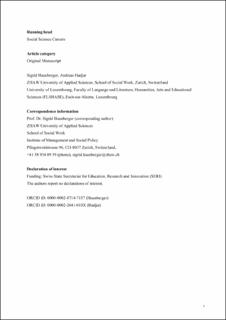Please use this identifier to cite or link to this item:
https://doi.org/10.21256/zhaw-19862Full metadata record
| DC Field | Value | Language |
|---|---|---|
| dc.contributor.author | Haunberger, Sigrid | - |
| dc.contributor.author | Hadjar, Andreas | - |
| dc.date.accessioned | 2020-04-01T12:40:52Z | - |
| dc.date.available | 2020-04-01T12:40:52Z | - |
| dc.date.issued | 2020-02-11 | - |
| dc.identifier.issn | 0020-8728 | de_CH |
| dc.identifier.issn | 1461-7234 | de_CH |
| dc.identifier.uri | https://digitalcollection.zhaw.ch/handle/11475/19862 | - |
| dc.description | Copyright © 2020 Sage | de_CH |
| dc.description.abstract | In this article, we discuss the question of why only a few men decide to study social science courses such as social work. While the conceptual base of our analysis includes the theory of planned behaviour and theories centring on gender role orientations, the empirical base is a random cluster sample of high-school graduates in Switzerland. The results show different gender effects, as well as direct and indirect effects, for all the theory of planned behaviour factors. Gender role orientations and the question of how a social science profession fits one’s own gender identity appear to be of particular importance only among male students. | de_CH |
| dc.language.iso | en | de_CH |
| dc.publisher | Sage | de_CH |
| dc.relation.ispartof | International Social Work | de_CH |
| dc.rights | Licence according to publishing contract | de_CH |
| dc.subject | Gender role orientation | de_CH |
| dc.subject | Gender-specific study choice | de_CH |
| dc.subject | Social sciences | de_CH |
| dc.subject | Social work | de_CH |
| dc.subject | Theory of planned behaviour | de_CH |
| dc.subject.ddc | 300: Sozialwissenschaften | de_CH |
| dc.subject.ddc | 378: Hochschulbildung | de_CH |
| dc.title | Why are male students less likely to opt for social science courses? : a theory-driven analysis | de_CH |
| dc.type | Beitrag in wissenschaftlicher Zeitschrift | de_CH |
| dcterms.type | Text | de_CH |
| zhaw.departement | Soziale Arbeit | de_CH |
| zhaw.organisationalunit | Institut für Sozialmanagement (ISM) | de_CH |
| dc.identifier.doi | 10.1177/0020872819884982 | de_CH |
| dc.identifier.doi | 10.21256/zhaw-19862 | - |
| zhaw.funding.eu | No | de_CH |
| zhaw.issue | 1 | de_CH |
| zhaw.originated.zhaw | Yes | de_CH |
| zhaw.pages.end | 34 | de_CH |
| zhaw.pages.start | 17 | de_CH |
| zhaw.publication.status | acceptedVersion | de_CH |
| zhaw.volume | 65 | de_CH |
| zhaw.publication.review | Peer review (Publikation) | de_CH |
| zhaw.author.additional | No | de_CH |
| Appears in collections: | Publikationen Soziale Arbeit | |
Files in This Item:
| File | Description | Size | Format | |
|---|---|---|---|---|
| 2020_Haunberger-Hadjar_Male-Students-Social-Science-Courses.pdf | Accepted Version | 466.06 kB | Adobe PDF |  View/Open |
Show simple item record
Haunberger, S., & Hadjar, A. (2020). Why are male students less likely to opt for social science courses? : a theory-driven analysis. International Social Work, 65(1), 17–34. https://doi.org/10.1177/0020872819884982
Haunberger, S. and Hadjar, A. (2020) ‘Why are male students less likely to opt for social science courses? : a theory-driven analysis’, International Social Work, 65(1), pp. 17–34. Available at: https://doi.org/10.1177/0020872819884982.
S. Haunberger and A. Hadjar, “Why are male students less likely to opt for social science courses? : a theory-driven analysis,” International Social Work, vol. 65, no. 1, pp. 17–34, Feb. 2020, doi: 10.1177/0020872819884982.
HAUNBERGER, Sigrid und Andreas HADJAR, 2020. Why are male students less likely to opt for social science courses? : a theory-driven analysis. International Social Work. 11 Februar 2020. Bd. 65, Nr. 1, S. 17–34. DOI 10.1177/0020872819884982
Haunberger, Sigrid, and Andreas Hadjar. 2020. “Why Are Male Students Less Likely to Opt for Social Science Courses? : A Theory-Driven Analysis.” International Social Work 65 (1): 17–34. https://doi.org/10.1177/0020872819884982.
Haunberger, Sigrid, and Andreas Hadjar. “Why Are Male Students Less Likely to Opt for Social Science Courses? : A Theory-Driven Analysis.” International Social Work, vol. 65, no. 1, Feb. 2020, pp. 17–34, https://doi.org/10.1177/0020872819884982.
Items in DSpace are protected by copyright, with all rights reserved, unless otherwise indicated.